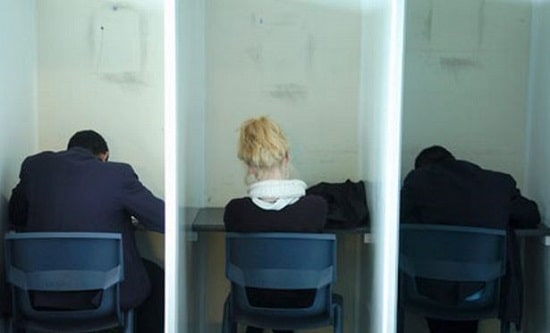
Pupils are being subjected to ‘distressing and degrading’ isolation as punishment for such innocuous infractions as wearing their hair in the ‘wrong’ style or forgetting equipment, according to research by the Children’s Commissioner Anne Longfield. Longfield’s ongoing research aims to determine how widespread the draconian punishment has become; at least one school has converted a toilet block into isolation cubicles, and another uses a cardboard booth to restrict ‘disruptive’ children. RUBY MOST reports.
Cruel and unusual punishment
Pupils have reported being sent to isolation rooms for hours, days and even weeks at a time, kept away from their peers to sit in silence, ordered not to look left or right, and only allowed to leave the room for three toilet breaks in a day. Extreme and socially detrimental punishments like exclusions, ‘managed moves’ (a form of unofficial exclusion), isolation and zero-tolerance behaviour policies are increasingly being used to police working class children, as part of a ‘crack down’ on a fictional epidemic of ‘bad behaviour’.
A report by the Centre for Mental Health charity published on 9 January 2020 warned restrictive interventions like isolation and exclusion rather than improving ‘challenging behaviour’ exacerbate underlying trauma and mental health issues, and push children into a vicious cycle. The isolation aggravates emotional distress, children react by behaving in a more ‘challenging’ way, they are put in isolation which causes further emotional distress, and so on. Guidance on isolation by the Department for Education (DfE) states that it should only be used in ‘exceptional circumstances’ and for a ‘limited period’, yet pupils have reported being repeatedly sent to isolation and missing months of learning for harmless conduct such as talking during the isolation period.
Rather than being used only as a last resort, isolation is being employed by some schools, particularly academies, as a cheap and appallingly cruel way of containing and managing behaviour. Vulnerable pupils, particularly those with SEND (special educational needs and disabilities), are being thrown into isolation booths because they do not have adequate provision, especially after their support in school and social services was ripped away by the last decade of austerity. Child and adolescent mental health services have been chronically underfunded to the point that they are turning away more than 25% of children referred to them in a crisis, according to a report published on 10 January. Preparation for a legal challenge against the DfE began in April 2019 on behalf of two children with SEND who’d been in isolation for so long that their mental health had dramatically deteriorated, one so severely that she attempted suicide in the booth.
Zero tolerance, zero evidence
Advocates of the Victorian punishment include the Tory government’s behaviour ‘tsar’ Tom Bennett, who argues isolation rooms are merely ‘safe spaces’ where dangerous or violently disruptive children are supervised by adults, in order to make classrooms more orderly and productive. In October 2019 Bennett tweeted approval of a zero-tolerance behaviour policy which includes hour-long detentions for children who dare to ‘question a decision’ by asking ‘why?’, and a blatantly racist rule of two-hour detentions for children caught kissing their teeth. The anti-racist campaign group No More Exclusions denounced Bennett’s support for the policy, which targets working class BAME children with extreme punishments for the crime of showing displeasure or wearing their hair in braids.
Bennett, due to lead the Tory government’s £10m crackdown on ‘bad behaviour’ from September 2020, is the editor of researchED magazine which claims to promote ‘research, evidence and best practice’ in education. When he was challenged on twitter to prove the claim in the Tories’ general election manifesto, where they claimed to have improved school outcomes and behaviour by creating ‘an environment where there is no disruption and no excuses for bad behaviour’, Bennett was forced to admit that he had no evidence to back up the boasting. Zero-tolerance policies similarly have zero evidence to justify their use; no high-quality studies have been conducted on their use in English schools. A report by the Education Endowment Foundation, a government-funded education charity, published 7 June 2019, demonstrated that according to the evidence there is no crisis of ‘bad behaviour’; the proportion of teachers rating behaviour at their schools as good or better has remained relatively stable for the past 10 years, at 70-76%.
Many parents, teaching staff and mental health specialists are calling for the use of isolation to be banned or only to be used as a last resort. Campaigners organised a ‘Lose the Booths’ conference on 25 January to share alternative long-term strategies which do not rely on dehumanising and caging children to manage their behaviour. Simon Flowers, head teacher of Carr Manor Community school, which is hosting the conference, rejects the ‘punitive system with isolation rooms’, instead advocating for an alternative vision: one where ‘if something happens we pull together. Adults model the behaviour that shapes children, they don’t try to control them with laminated sheets of rules and punishments’.
The real problem is not ‘bad behaviour’, but that state-run schools are a training ground for working class children to be indoctrinated to take their position in a grossly unequal capitalist society – one where they had better learn to control their behaviour. Isolation is just one ideological weapon used to teach working class children to comply or to lose their rights – their right to an education, their right to ask ‘why’.
Fight Racism! Fight Imperialism! No 274, February/March 2020




